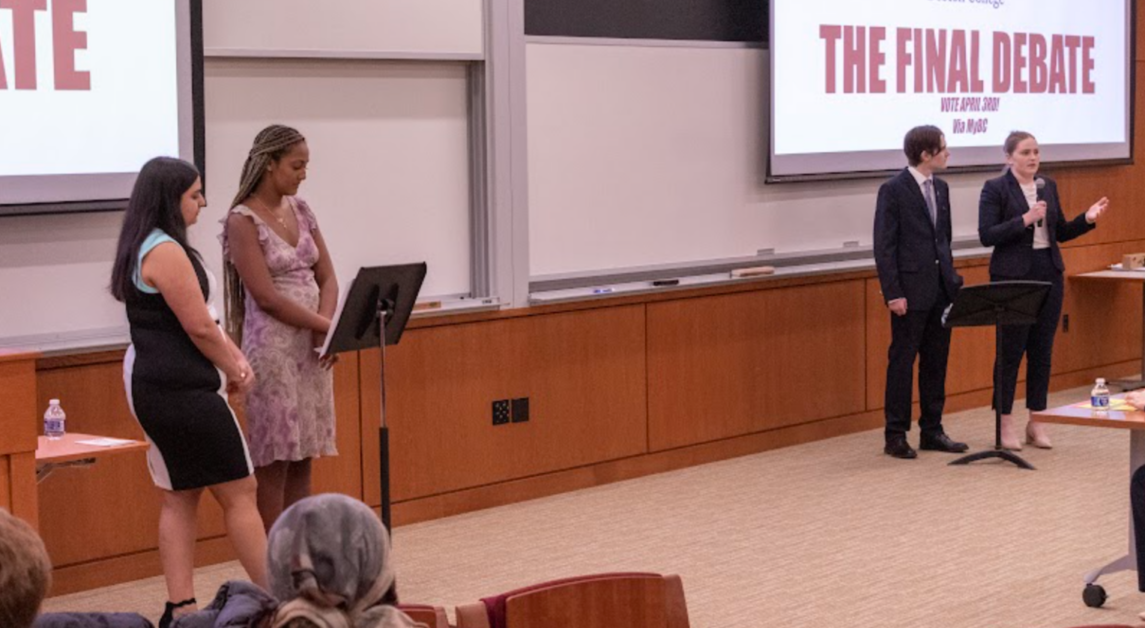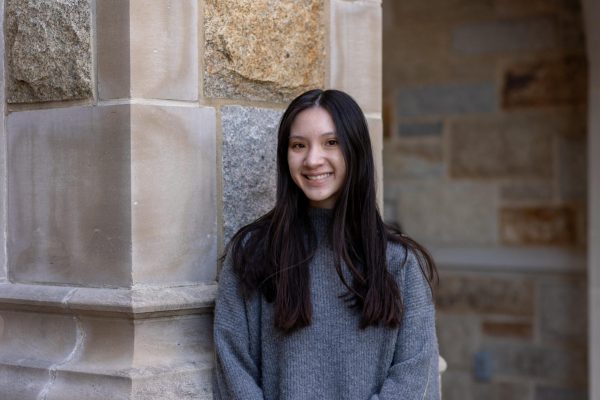The Elections Committee held the final debate, which began with opening statements from presidential candidates Jonah Kotzen and Jordan Nakash, as well as their respective running mates.
Kotzen, policy coordinator of the Council for Students with Disabilities (CSD) and MCAS ’24, said he and running mate Meghan Heckelman, LSEHD ’25, based their campaign around creating a community for students at Boston College.
“I found my community in UGBC, and I found my community in CSD,” Kotzen said. “And that’s what our campaign is based on—community, ‘Eagles for Others,’ you know, servant leadership. We want to make the student body feel like they have a community here.”
Nakash—BAIC ambassador, former Student Assembly (SA) representative, and MCAS ’24—said she took the past year off from UGBC. During that year, Nakash said she learned how to advocate for students by being there for them.
“It’s not just about hearing their complaints or their concerns and then going to advocate for them, but getting to know them,” Nakash said. “Not so much about ‘What do you want,’ but ‘Why do you want it, and how I can help you.’”
The teams then talked about ways they would plan on improving BC’s academic advising process if elected.
Kotzen said there should be special advising for double majors. He also added that professors should be better trained in how to advise students on what classes to take.
“When individuals seek out help from our professors, they should be able to have access to that resource, and I think that that’s something that Meghan and I want to communicate with the administration here at our school,” Kotzen said.
Yosan Tewelde, Nakash’s running mate and MCAS ’24, said their team aims to offer more advising resources for students, including full-time academic advisors.
“If elected, me and Jordan would also advocate for full-time advisers, so that there are people who are dedicated to advising before another profession as being a professor, and more required check-ins throughout the year, not just around registration time when it always feels like it’s too late already,” Tewelde, AHANA+ Leadership Council general coordinator, said.
Nakash said she and Tewelde have discussed ways to improve mental health for all students, including implementing de-stress events specifically for student-athletes.
Tewelde suggested implementing excused mental health days and making University Counseling Services (UCS) easier to access.
“Boston College definitely needs to improve their mental health services in general for students,” Tewelde said. “And we want to implement initiatives in addition to the ones we highlighted for athletes, but including a mental health day initiative to let all students have a day off and to make UCS more accessible.”
Heckelman advocated that the University better utilize the peer wellness coaches at the Center for Student Wellness and more clearly advertise UCS’ resources by making its website more transparent.
“1,100 college students commit suicide every year,” Heckelman said. “How can we make sure that doesn’t happen at BC? It’s about caring for each other. It’s about expanding those resources and advertising those resources broader.”
Both teams also addressed sustainability and the use of Green2Go containers, a reusable to-go container program offered at selective dining halls.
In addition to adding an environment and sustainability SA representative, Kotzen said he and Heckelman want to eventually make the Green2Go program free for first-year students.
“We think it’s a vital initiative here to increase environmental sustainability, and we think that by having students, you know, not have to pay for them off the bat, it could exponentially increase their use and their efficiency,” Kotzen said.
Nakash proposed the idea of offering Green2Go containers at orientation and Welcome Week so students become more accustomed to using them.
“We could have a pilot program [at orientation] where they’re using Green2Go for the whole time,” Nakash said. “So by truly incorporating it into our lives instead of making it seem like a secondary thing during dining, I think that’s one way we can expand it.”
The teams then discussed the need for more electric vehicles around campus.
Nakash said she plans on using her connections with the Office of Parking and Transportation to introduce more electric vehicle charging stations on campus, so more buses can transition from diesel to electric.
Kotzen said he and Heckelman also want to see more electric vehicle use on campus, with their ultimate goal being divestment.
“We want to see Eagle Escort use more electric vehicles, we want to see BCPD use more hybrid and electric vehicles, as well as buses,” Kotzen said. “I think it’s important to see that this is a very short-term, pragmatic step in order to reach that end goal of divestment.”
Kotzen said if he and Heckelman are not elected, he plans to continue working on the CSD and advocating for students with disabilities.
“We can see change on our campus in terms of accessibility, in terms of inclusion, and trying to finally end that social isolation that students with disabilities feel here on campus,” Kotzen said.
Nakash similarly said she will continue to be there for other students if she and Tewelde are not elected.
“A big thing with ‘Unite the Heights’ is that we want to make students feel at home on campus, and another way that we can do that is by being there for them,” Nakash said.














